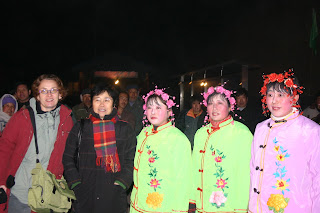We are entering the Year of the Pig, which means everywhere you go things with pigs on them are for sale, including all manner of adorable stuffed pig toys. I find this only slightly ironic, given that, in Chinese “meat” (rou) is basically a synonym for “pork” and that supposedly half of the pigs in the world are Chinese pigs. Apparently this year is also a “Golden Pig” year, which is considered very propitious and which means that lots of couples are trying to conceive to have babies born in the year of the Golden Pig. Schools are apparently preparing for an upsurge in entrants in six years.
Perhaps some of these people are visiting the “Beijing Tian Lun Sterility Hospital,” the advertisement for which I enjoyed so much I decided to share it here. This is an outstanding example of so many phenomena—globalization leading to the mixing of cultures, Chinese appropriation of Western cultural symbols for interesting uses, and of course, rather tolerant interpretations of copyright laws.
 Also, people here can only dream of having 12 children. And I have yet to see anyone remotely resembling Steve Martin.
Also, people here can only dream of having 12 children. And I have yet to see anyone remotely resembling Steve Martin.One note on the notorious “one-child policy”: the first products of the one-child policy, which began in the late 1970s, are getting to be childbearing age, and if both members of a couple are single children they are allowed to have two children.
Firecrackers are being sold in stands all over the place—very much like the Fourth of July. This is one reason why I’m glad I am decamping for Japan on Saturday. I’ll be there for ten days, visiting a former student, Kelly Bolen, who is in her second year there on the JET program, teaching English in a small town called Tochio. We’ll be visiting Kelly’s home turf in Niigata and Tochio (I’m excited about her friend the sushi chef!) and then her former host family in Nagasaki. After that we will visit Unzen for some hiking in the national park there. Then I’m going to spend a few days based in Kamakura, which was the 12th century capital of Japan and has lots of Zen temples. It is only about an hour out of Tokyo so I expect I’ll get a day in Tokyo as well.
So this will be my last post for awhile--check back at the end of February for more!




